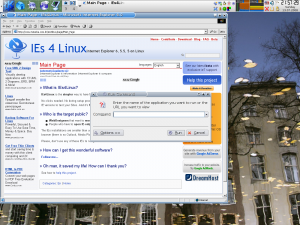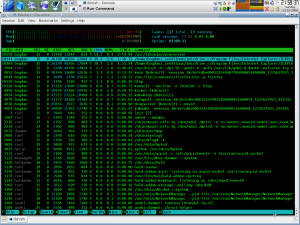15th July 2008
http://debian.org.ua/ and ftp://debian.org.ua/
What is on offer (mirrors):
- backports.org
- cygwin
- deb.opera.com
- debian – stable, testing, sid
- debian-archive (starting from 1.1!)
- debian-multimedia
- installation media (CDs/DVDs)
- debian-security
- even debian-volatile is here!
All this goodness is only 3 hops away from my DSL modem…. (ISP UkrTelecom)
Gone editing /etc/apt/sources.list 
P.S. For non-ukrainian IPs, access might be slow/bandwidth-limited; for Ukrainian IPs, speed might be up to 100MBit/sec.
Update: some time after publishing this post, debian.org.ua was down for some reason. When it was up, it was serving me packages with a mere 3 kb/sec  . I found that ftp2.debian.org.ua mirror is faster at the moment.
. I found that ftp2.debian.org.ua mirror is faster at the moment.
Posted in *nix, Links | No Comments »
13th July 2008
IEs4Linux provides a convenient package of Internet Explorer 5.0, 5.5, 6.0, and (partially supported) 7.0 for Linux.
It installed and runs fine under Debian Etch:

However, as you could notice from the screenshot above, CPU use is almost 100% while IE6Linux is running. It is better illustrated by the next screen:

I didn’t yet bother finding out what’s wrong, but that must have some kind of a fix, as running at 100% CPU on a laptop is … hot.
Posted in *nix, Links | No Comments »
11th July 2008
Posted in *nix, how-to, Links | No Comments »
8th May 2008
Note, that under Gnome I only had to use a single system-wide utility to bind volume buttons to volume control. Under KDE things were a tad tougher.
First, you may want to look for kmilo (if you don’t have it yet). It has several plugins e.g. for ThinkPad and Vaio laptops, as well as “generic” plugin. I didn’t try this solution, though.
If you need more than kmilo can offer: keyTouch could help. keyTouch should be good also for non-laptop multimedia keyboards. However, this also wasn’t the solution I used.
If you want to know how to map your special keys to functions yourself – then read on.
Read the rest of this entry »
Posted in *nix, Links | 4 Comments »
15th March 2008
Earlier, I wrote about Universal boot CD , which is targeted primarily at the hardware testing/diagnosing.
If not hardware, but “only” software is malfunctioning – try SystemRescueCD, a Linux-based recovery CD/DVD/Flash stick (it all depends on how you burn/install the downloaded file – manuals and how-to’s are available).
As always, Disclaimer: I am in no way associated with SystemRescueCD, and gain no profit from this post. Any advice I give is provided AS IS, with no guarantees of fitness to your exact case.
Posted in *nix, Links, Notepad | 4 Comments »
12th March 2008
Note: this post is based on the comment by Simon, who generously shared his experience.
Step-by-step:
- Download the compiled ffmpeg with libmp3lame support (direct download links: older version ffmpeg.with.lame and newer version ffmpeg.2007-10-28.with-libmp3lame-support).
- Rename the downloaded executable file to “ffmpeg” (no extension), upload it to the directory on your server (in this example /home/myusername/).
- Download libmp3lame.so.0.
- Upload libmp3lame.so.0 to the same directory where you placed ffmpeg in.
- Create a php file with the following code (remember to change the paths to your own, where you actually uploaded binaries in previous steps):
<?php
exec("export LD_LIBRARY_PATH=/home/myusername/");
echo passthru("/home/myusername/ffmpeg -formats");
?>
- If you access that PHP file with your browser, you should be able to see a list of formats which are supported by ffmpeg, and if you find “EA libmp3lame” somewhere in the output, then it means you now can Encode Audio in libmp3lame!
- If that doesn’t work for you: LD_LIBRARY_PATH can be a protected variable in PHP (you can check for this by searching for the “safe_mode_protected_env_vars” value in phpinfo() output). The workaround here can be to write your commands to a file from php, then chmod that file with 0755 permissions (rwx-rx-rx), and run the file through exec(). In this way, PHP is not changing the LD_LIBRARY_PATH, but telling the server to run a file, which tells the server to change it. This method worked for the original author of these instructions.
For passing arguments to the PHP wrapper script – check out PHP’s $argv variable (more on this here). If you decided to use shell-script as a wrapper for “export LD_LIBRARY_PATH”, then using $1, $2 etc will allow you to pass parameters to the shell script, e.g. in the example below
#!/bin/bash
export LD_LIBRARY_PATH=/home/myusername/
/home/myusername/ffmpeg -i /home/myusername/$1 $2 /home/myusername/$3
you could pass “input file” as first argument, “parameters” as second and “output file” as third to make such a wrapper script work.
Posted in *nix, PHP, Programming, Software, Web | 19 Comments »
25th October 2007
Update: there’s now a much more recent post on how to install libmp3lame-enabled ffmpeg on shared linux hosting.
As Gabe pointed out in my post with compiled ffmpeg Linux binaries, there is a relatively simple method of adding libmp3lame.so.0 file to your shared hosting so that ffmpeg executable will see the library:
You can upload libmp4lame.so as well to the shared hosting site and when you call ffmpeg, call something to set an environment variable right before the call to ffmpeg i.e. in php I’d do exec(â€export LD_LIBRARY_PATH=/path/to/lib/with/lame; /path/to/ffmpeg [ffmpegargs]â€); That way you can use the uploaded lame. I hope that helps someone as I have been unable to find any info on how to use an uploaded lame. I’ve tried it and it works on godaddy.
Hope this helps.
Update: here’s libmp3lame.so.0.0.0 (from slackware 2.4.x, lame-3.97). I have no idea if it’ll work in your (shared hosting) environment; it is provided AS IS, use at your own risk etc. I can only state that the archived binary file at the moment of upload was indeed libmp3lame.so.0.0.0 from my elderly Slackware with 2.4.x kernel.
Posted in *nix, Software, Web | 9 Comments »
![]()
![]() . I found that ftp2.debian.org.ua mirror is faster at the moment.
. I found that ftp2.debian.org.ua mirror is faster at the moment.

